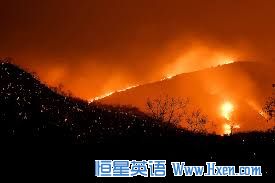正文
经济学人下载:针叶换取水资源(1)
Killing two birds with one stone is a desirable objective, but rarely an achievable one.
一石二鸟是一个令人向往的目标,但很难实现。
However, Dinesh Mohan of Nehru University, in Delhi,
然而,德里尼赫鲁大学的Dinesh Mohan认为
thinks he may have worked out how to do it in the case of a pair of local environmental problems.
他可能已经想出了解决当地两个环境问题的方法。
One is the risk of fire in the pine forests cloaking the foothills of the Himalaya.
一个是隐藏在喜马拉雅山山麓的松林火灾风险。

The other is pollution by heavy metals, particularly lead, of some of the country's water supply.
另一个是该国水源中的重金属污染问题,尤其是铅。
The fire risk comes from pines' needle-like leaves. These decay only slowly once shed,
火灾风险来自于松树针状的叶子。一旦脱落,这些叶子腐化进度缓慢,
and thus build up on the ground into thick, inflammable layers. Nor are they just a fire hazard.
因此在地面上形成了厚且易燃的树叶层。它们不仅仅是火灾隐患。
They also slow down the replenishment of groundwater and make the soil more acidic than it otherwise would be,
它们还放慢了地下水补给的速度,使土壤酸性比正常情况下更强,
discouraging the growth of grass and other non-arboreal plants.
阻碍了草地和其他非树生植物的生长。
The pollution risk comes from lead derived from fuels, old water pipes and paint.
污染风险来自于燃料、旧水管和油气中的铅。
Heavy-metal pollution is by no means the only water-quality problem facing India, but it is one of the most pernicious.
重金属污染绝不是印度面临的唯一水质量问题,但却是最致命的问题之一。
Like many other countries, India has adopted the maximum level in drinking water for lead set by the World Health Organisation (WHO).
和很多其他国家一样,印度采用的是世界卫生组织(WHO)设定的饮用水铅含量上限。
This is ten micrograms per litre. In 2014 (the most recent year for which data are available)
即每升10微克。在2014年(这几年唯一公开的数据)
the country's Central Water Commission reported concentrations above this threshold at 47 of its 387 river-water-quality monitoring stations.
该国的中央水务委员会报告称,在其387个河流水质监测站中,有47个的浓度超过了这一阈值。
The simultaneous solution of the two problems, proposed by Dr Mohan in a paper in ACS Omega, is simple and elegant.
Mohan博士在《ACS Omega》的一篇论文中提到,同时解决这两个问题的方法,既简单又精妙。
It is to use the needles to clean up the water.
即利用针叶净化水源。
One way to extract heavy metals like lead from polluted water is to pass that water through charcoal filters.
从被污染的水中提取铅等重金属的一种方法是通过木炭过滤器。
Charcoal, or "biochar" as it is now fashionably known in environmental circles, is a porous, amorphous material,
木炭,或现在环保圈中流行的称呼“生物炭”,是一种多孔无定形材料,
which thereby folds a large surface area into a small volume. It is composed partly of elemental carbon,
因此这种材料可以将大的比表面积折成小体积。它一部分是由元素碳组成,
but this is accompanied by lots of organic molecules such as fatty acids, phenols and quinones,
另一部分由很多有机分子,比如脂酸、酚类化合物和醌类
and also by salts of potassium, magnesium and calcium, all left behind from its previous existence as plant matter.
还有钾、镁和钙的盐类组成,这些都是之前作为植物时所保留下来的。
Many heavy-metal ions react enthusiastically with certain oxygen-containing groups of atoms that form parts of the organic molecules, and thus stick to them.
很多重金属和某些含氧原子群发生剧烈反应,这些原子形成了有机分子一部分,并粘附在有机分子上。
They also, through a process called ion exchange, swap places with potassium, magnesium and calcium ions.
它们还通过离子交换,与钾离子、镁离子和钙离子交换位置。




 手机网站
手机网站